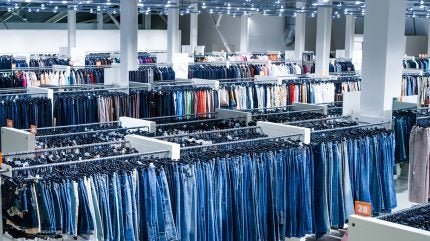
The IAF explains apparel and textiles are among the most globalised industries, historically foundational to industrial development around the world so steep tariffs represent a direct and unprovoked threat on these entire industries.
The IAF supports US President Donald Trump’s announcement on 9 April to have a 90-day suspension of “reciprocal” tariffs for all nations except China. However, it adds the tariffs announced on 2 April gave the highest rates to countries that are heavily dependent on clothing exports to the US.
A statement by the IAF reads: “The IAF welcomes the decision to pause a significant portion of these punishing tariffs. However, the continued application of punitive tariffs on imports from China, one of the world’s largest apparel exporters, remains deeply concerning and underscores the real and ongoing risk of tariff escalation for other nations.”
Overview of Trump’s tariffs ahead of 90-day pause
All countries except for China currently face a 10% base rate tariff to the US. However, once Trump’s 90-day tariff pause ends goods from the European Union will face a 20% duty, India will face a 26% hike in tariffs, Thailand’s tariffs on exports to the US will be 36% and Cambodian goods will be subject to a 49% duty increase; while those from Bangladesh face a 37% increase.
Imports from Pakistan will incur a 29% rise in tariffs, and Myanmar’s imports will see a similar 49% increase. The UK faces a 10% hike in tariffs.
Tariffs on Chinese exports to the US are not paused and currently sit at 145% after China imposed 125% on US exports to China.

US Tariffs are shifting - will you react or anticipate?
Don’t let policy changes catch you off guard. Stay proactive with real-time data and expert analysis.
By GlobalDataIAF reactions
The IAF has expressed concern that if these reciprocal tariffs go ahead after the 90-day pause it could destabilise economies and threaten jobs and businesses within the global apparel sector, including within the US.
The organisation emphasises that no strategy for supply chain resilience can endure such extensive tariff impositions. It has called upon the industry to lessen its susceptibility to abrupt policy changes by broadening the basis of competitiveness beyond merely cost considerations.
In addition, the federation advocates for robust and sustainable supply chains founded on long-term partnerships and mutual reliance rather than on volatile trade policies.
IAF states: “We implore that future trade negotiations have reasonable goals and that punishingly high tariffs on apparel do not return. Many apparel-exporting countries lack the domestic purchasing power to significantly boost imports from the US, making it unrealistic and unreasonable to demand steep trade balance corrections. Likewise, high tariffs will not realistically result in the large-scale return of apparel production to the US.”
What is the way forward?
The IAF fears that unpredictable trade policies could hinder investment and further destabilise markets as the global supply chain is still recovering from various disruptions like Covid-19 and the Red Sea crisis.
It plans to enhance its worldwide efforts to enable manufacturers and their associations to become strategic industry partners during this transition. It calls for brands and retailers to collaborate with manufacturers by upholding sourcing agreements, standards, and avoiding cost shifts that could compromise supply chain integrity.
“IAF stands with the global manufacturing community, committed to unity and collective strength to be able to weather this storm and then to move to a stronger position together. Through collaborative approaches and strategic partnerships, we can build a more resilient and sustainable future for the global apparel industry —one that benefits all stakeholders across the value chain and ensures long-term prosperity despite policy turbulence,” notes the IAF.
Navigate the shifting tariff landscape with real-time data and market-leading analysis. Request a free demo for GlobalData’s Strategic Intelligence here.




